Bài giảng Introduction to Computer Programming (C language) - Chapter 5: Repetition Statements - Võ Thị Ngọc Châu
Content
Introduction
while. Statements
do.while. Statements
for. Statements
Nested Repetition Statements
continue Statements
break Statements
Summary
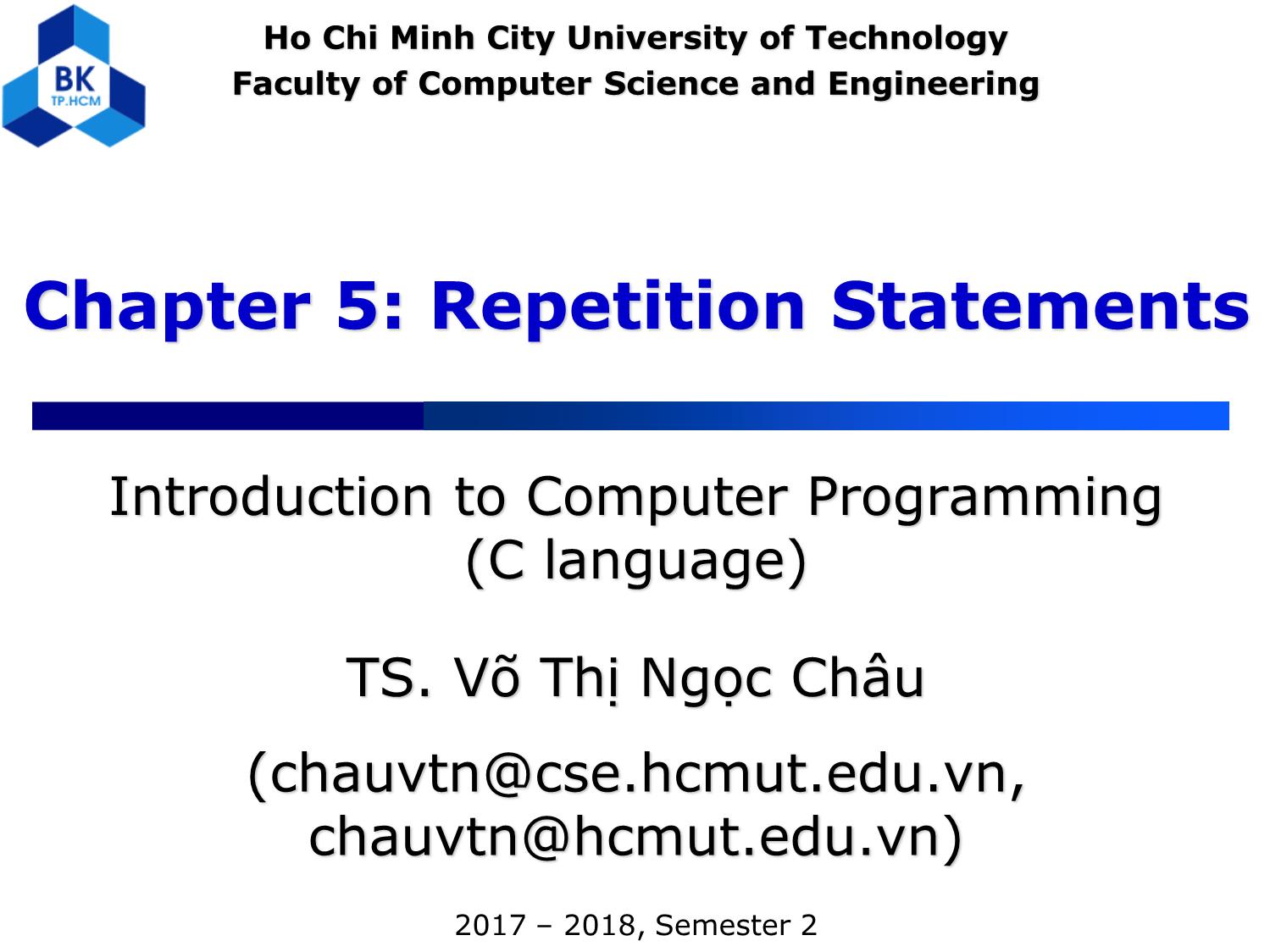
Trang 1
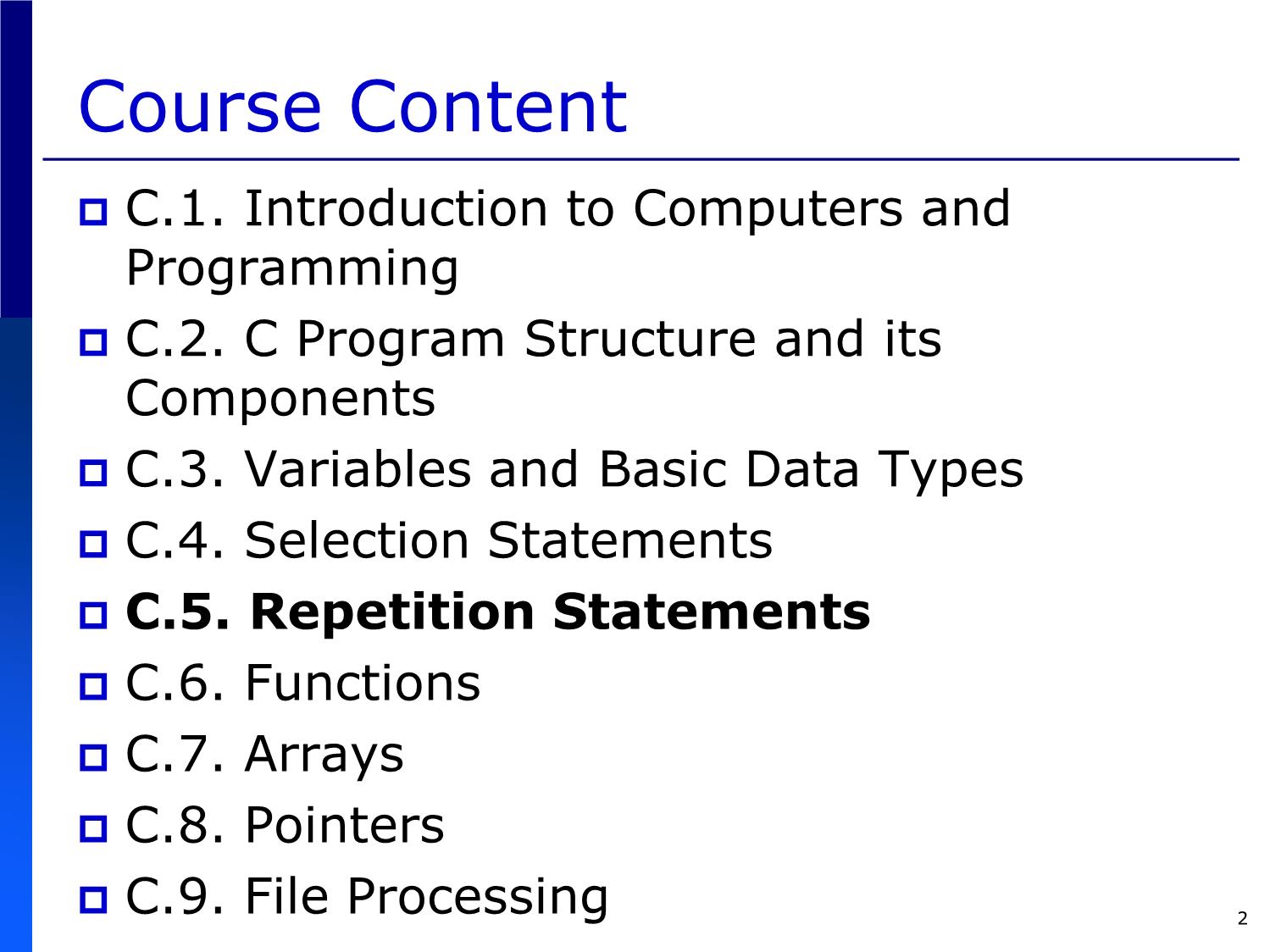
Trang 2
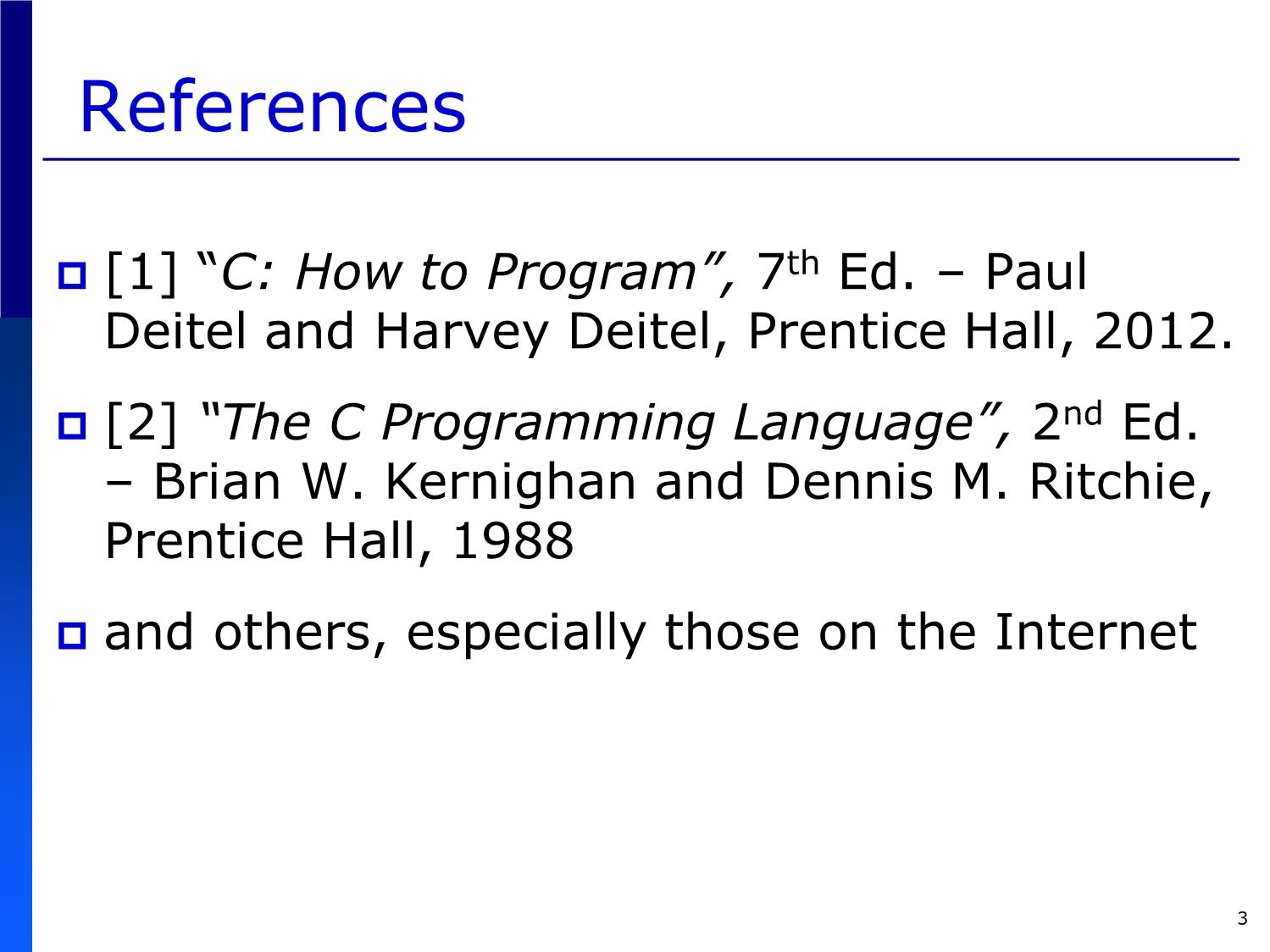
Trang 3
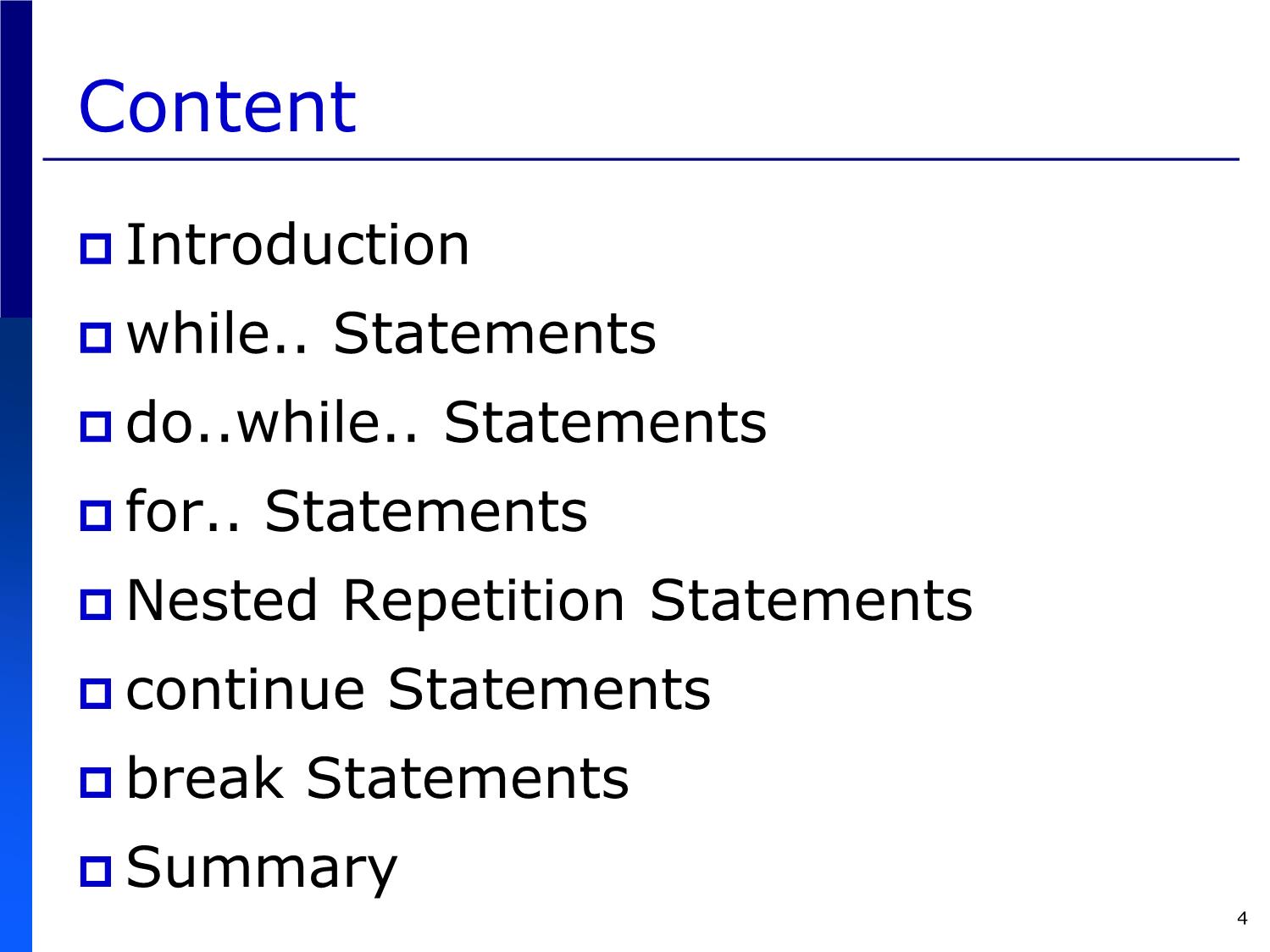
Trang 4
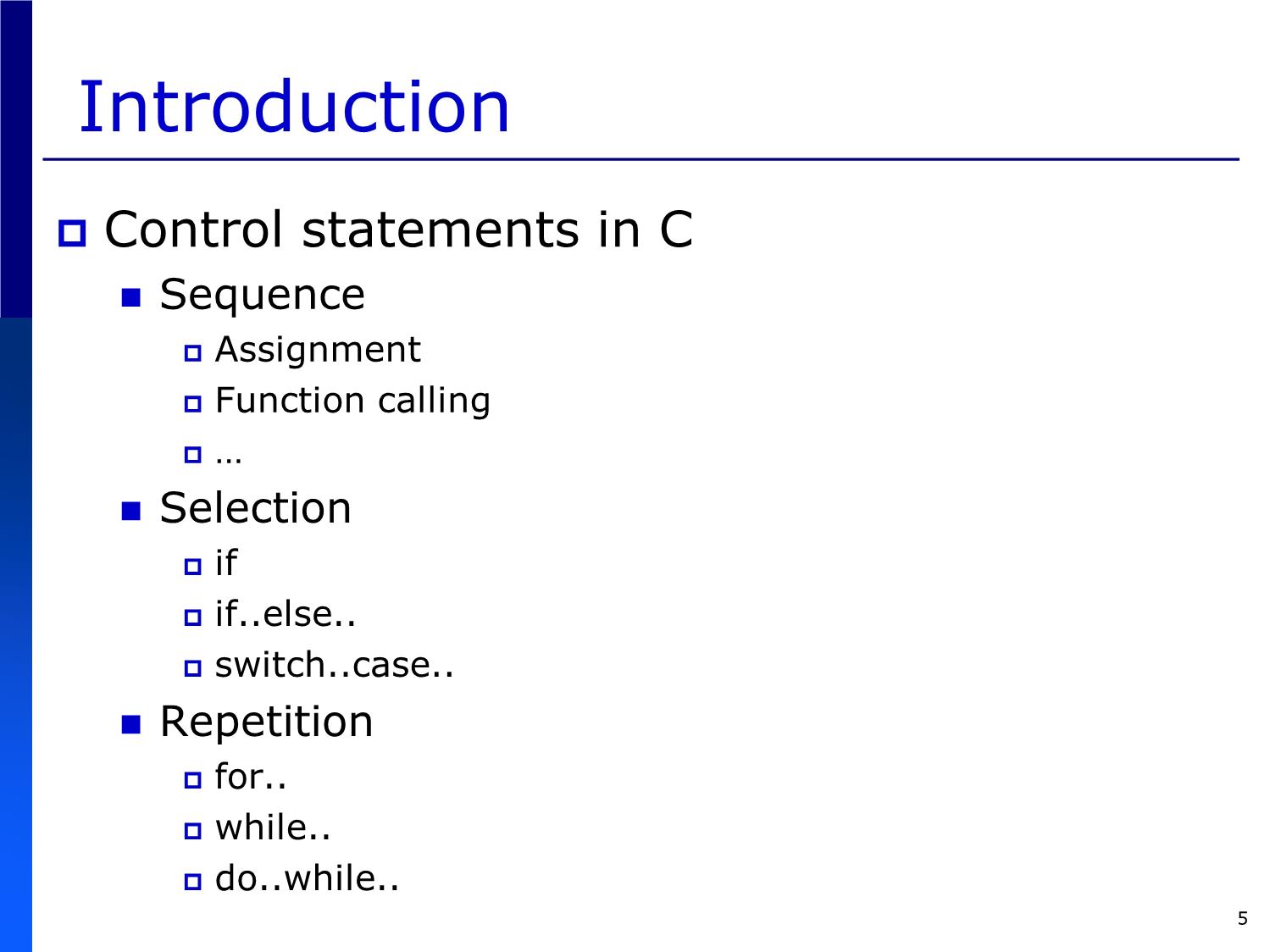
Trang 5
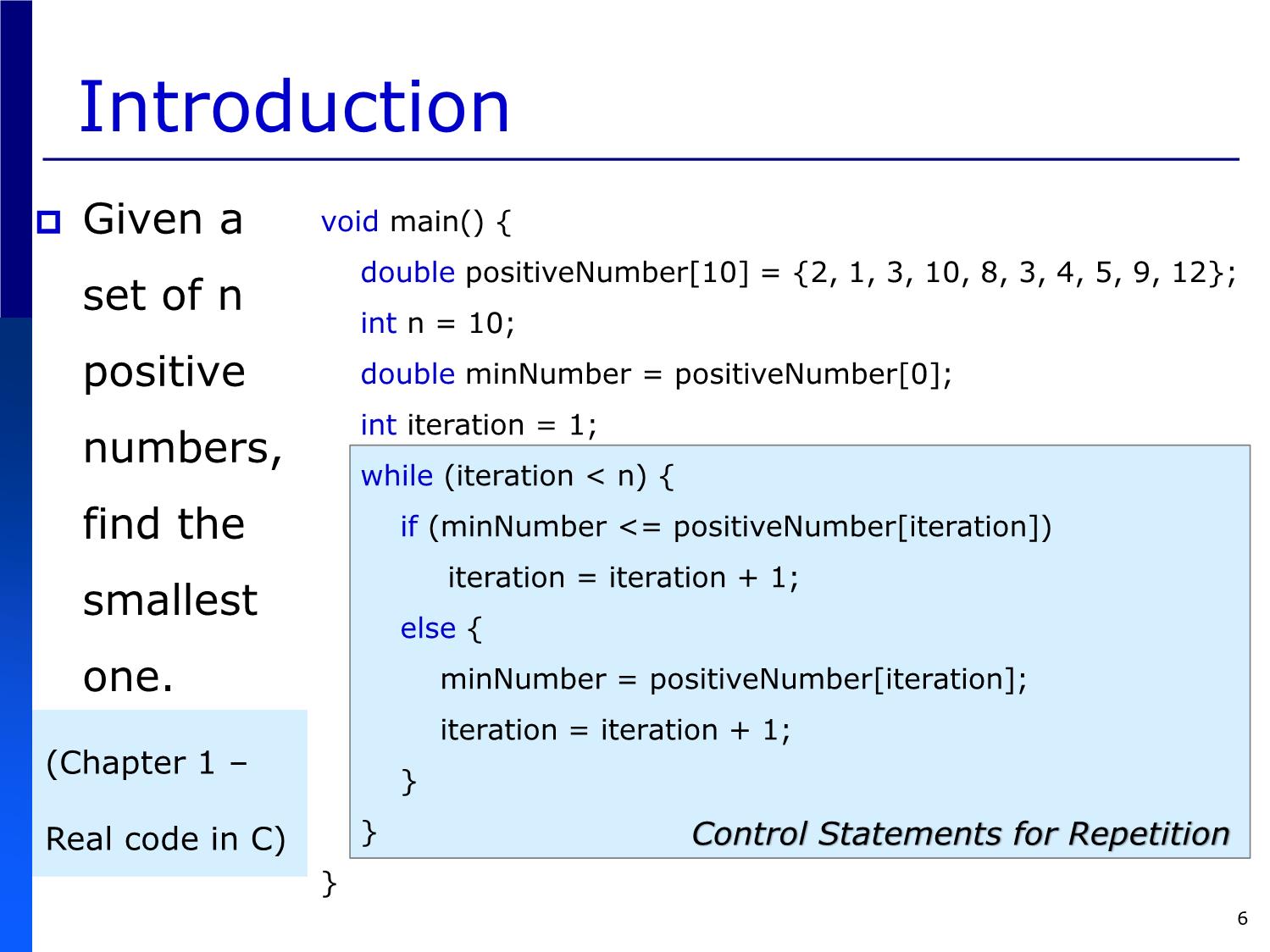
Trang 6
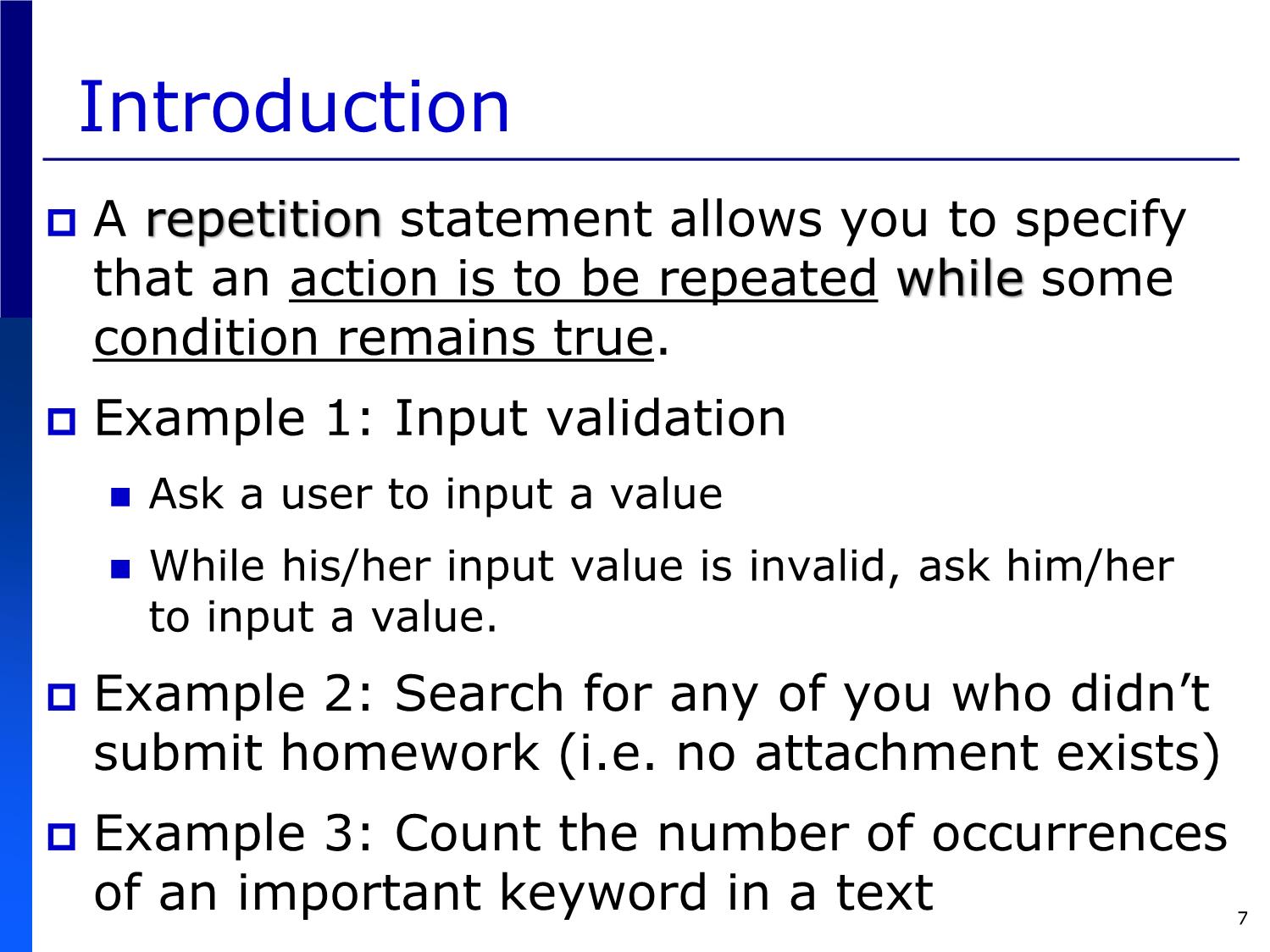
Trang 7
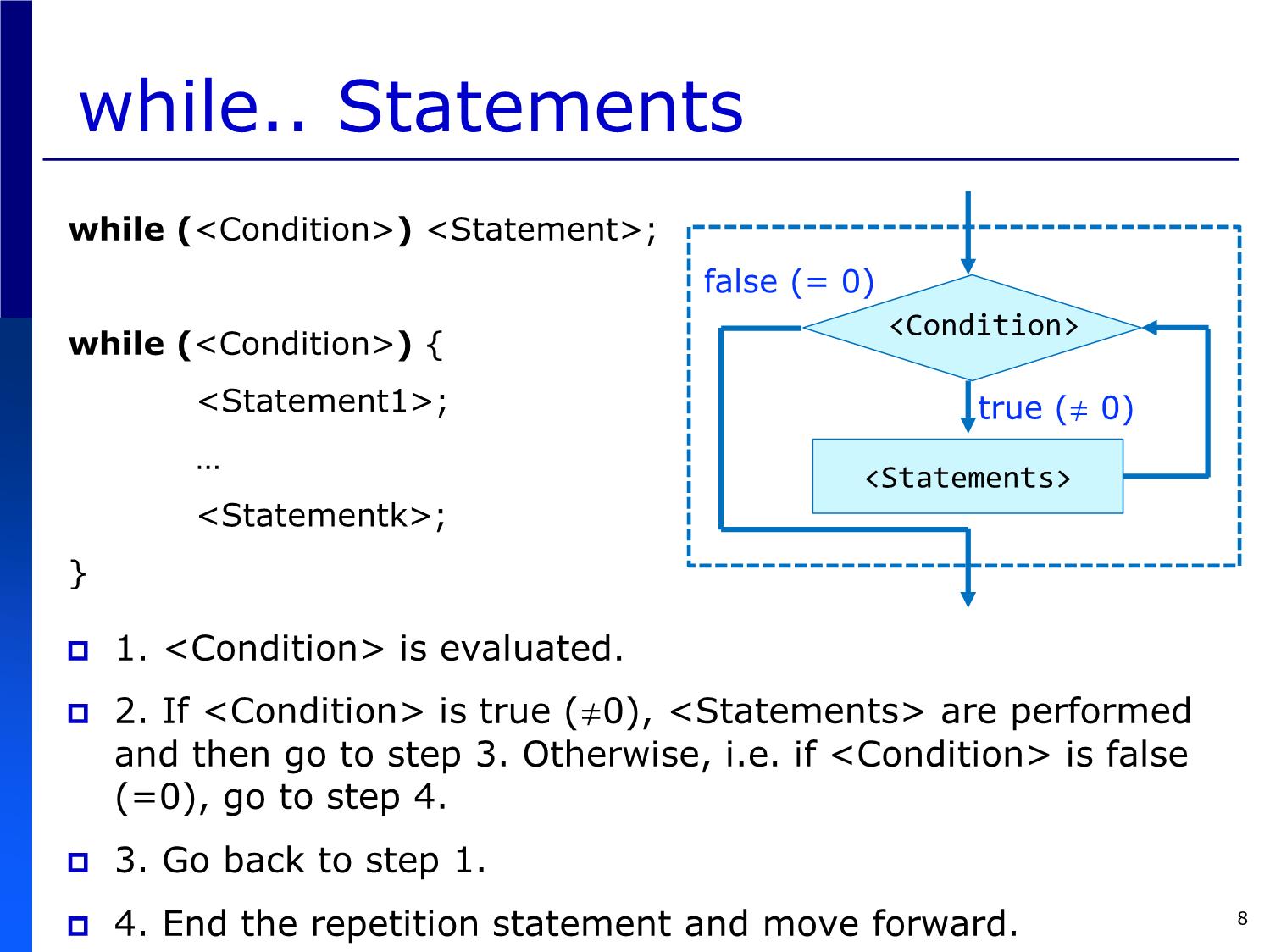
Trang 8
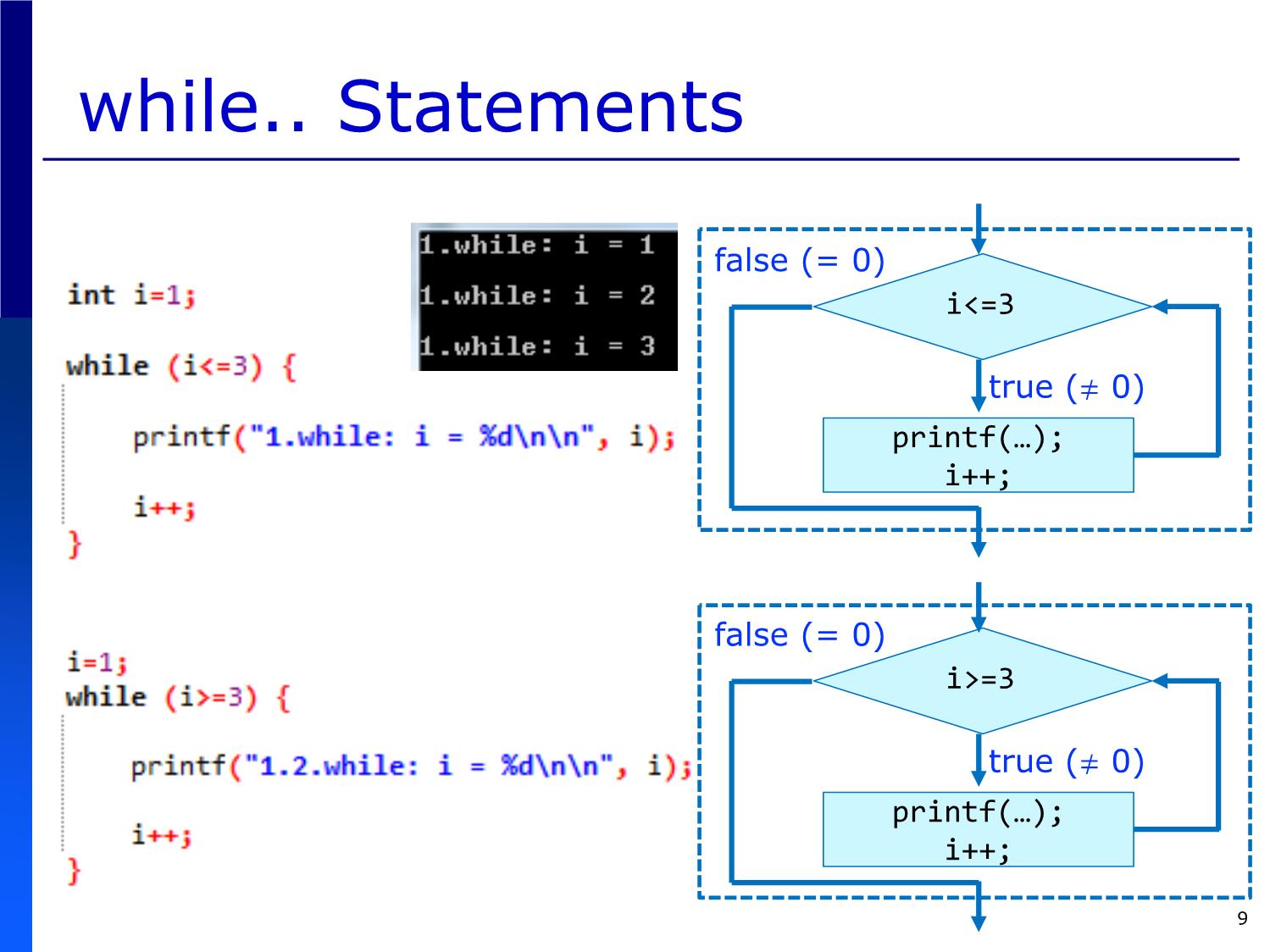
Trang 9
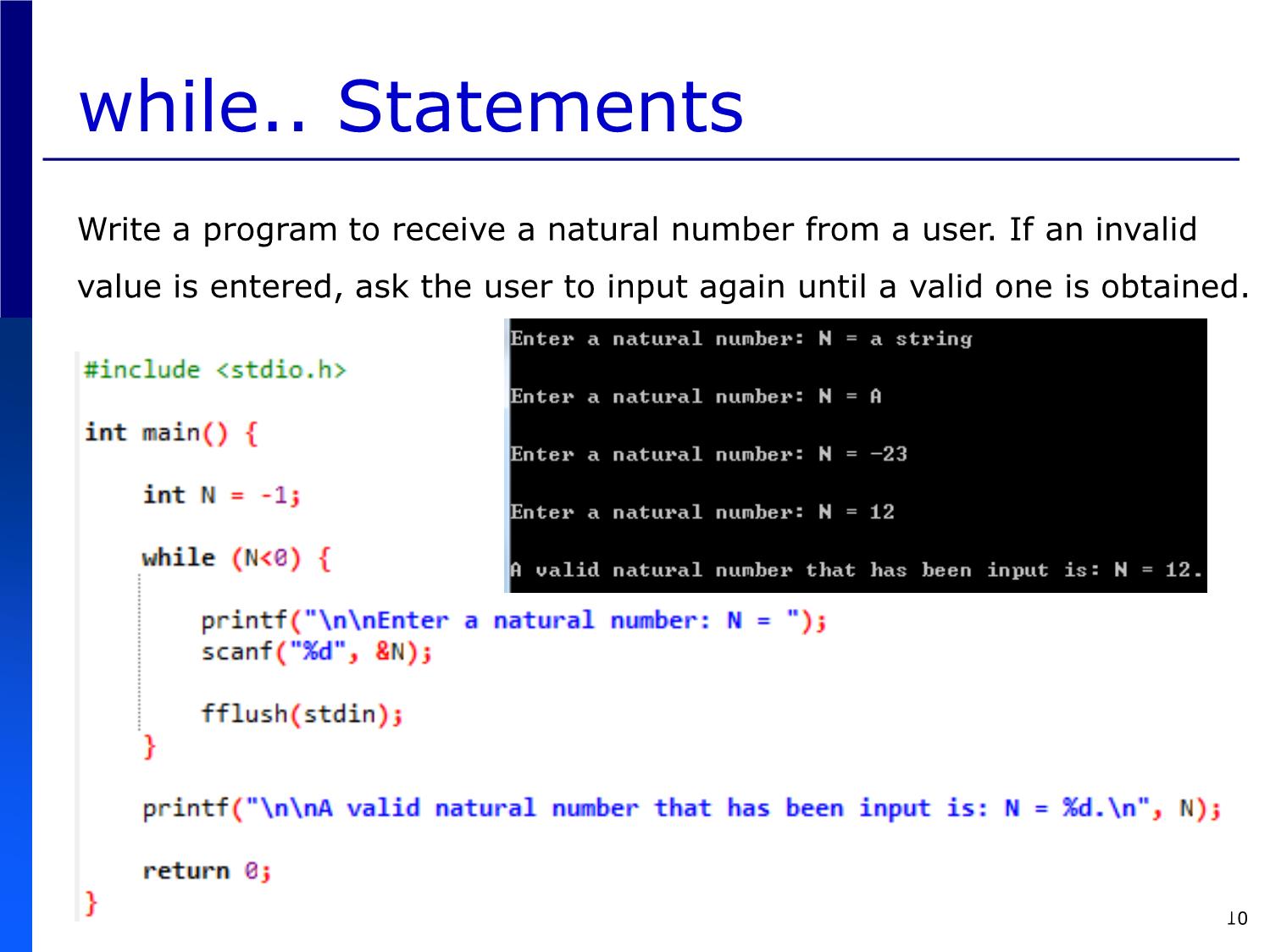
Trang 10
Tải về để xem bản đầy đủ
Bạn đang xem 10 trang mẫu của tài liệu "Bài giảng Introduction to Computer Programming (C language) - Chapter 5: Repetition Statements - Võ Thị Ngọc Châu", để tải tài liệu gốc về máy hãy click vào nút Download ở trên
Tóm tắt nội dung tài liệu: Bài giảng Introduction to Computer Programming (C language) - Chapter 5: Repetition Statements - Võ Thị Ngọc Châu
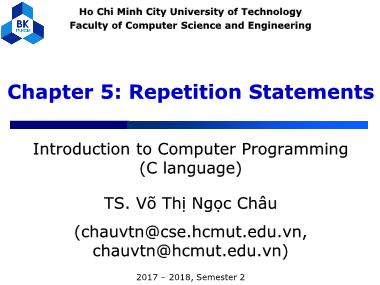
Ho Chi Minh City University of Technology
Faculty of Computer Science and Engineering
Chapter 5: Repetition Statements
Introduction to Computer Programming
(C language)
TS. Võ Thị Ngọc Châu
(chauvtn@cse.hcmut.edu.vn,
chauvtn@hcmut.edu.vn)
2017 – 2018, Semester 2
Course Content
C.1. Introduction to Computers and
Programming
C.2. C Program Structure and its
Components
C.3. Variables and Basic Data Types
C.4. Selection Statements
C.5. Repetition Statements
C.6. Functions
C.7. Arrays
C.8. Pointers
C.9. File Processing 2
References
[1] “C: How to Program”, 7th Ed. – Paul
Deitel and Harvey Deitel, Prentice Hall, 2012.
[2] “The C Programming Language”, 2nd Ed.
– Brian W. Kernighan and Dennis M. Ritchie,
Prentice Hall, 1988
and others, especially those on the Internet
3
Content
Introduction
while.. Statements
do..while.. Statements
for.. Statements
Nested Repetition Statements
continue Statements
break Statements
Summary
4
Introduction
Control statements in C
Sequence
Assignment
Function calling
Selection
if
if..else..
switch..case..
Repetition
for..
while..
do..while..
5
Introduction
Given a void main() {
double positiveNumber[10] = {2, 1, 3, 10, 8, 3, 4, 5, 9, 12};
set of n
int n = 10;
positive double minNumber = positiveNumber[0];
int iteration = 1;
numbers,
while (iteration < n) {
find the if (minNumber <= positiveNumber[iteration])
iteration = iteration + 1;
smallest
else {
one. minNumber = positiveNumber[iteration];
iteration = iteration + 1;
(Chapter 1 –
}
Real code in C) } Control Statements for Repetition
}
6
Introduction
A repetition statement allows you to specify
that an action is to be repeated while some
condition remains true.
Example 1: Input validation
Ask a user to input a value
While his/her input value is invalid, ask him/her
to input a value.
Example 2: Search for any of you who didn’t
submit homework (i.e. no attachment exists)
Example 3: Count the number of occurrences
of an important keyword in a text 7
while.. Statements
while () ;
false (= 0)
while () {
; true ( 0)
;
}
1. is evaluated.
2. If is true ( 0), are performed
and then go to step 3. Otherwise, i.e. if is false
(=0), go to step 4.
3. Go back to step 1.
4. End the repetition statement and move forward. 8
while.. Statements
false (= 0)
i<=3
true ( 0)
printf();
i++;
false (= 0)
i>=3
true ( 0)
printf();
i++;
9
while.. Statements
Write a program to receive a natural number from a user. If an invalid
value is entered, ask the user to input again until a valid one is obtained.
10
while.. Statements
Given N, the number of the first natural numbers
greater than 0, calculate and print the total sum of
these N first natural numbers.
11
while.. Statements
Given N, a natural number greater than 0, calculate and print the
factorial of N: N! = 1*2*..*N = (N-1)!*N
12
Given a natural number N
while.. Statementsgreater than 0, list a series of
Fibonacci numbers smaller than N.
13
do..while.. Statements
do {
;
; true( 0)
}
while (); false(=0)
are always
1. are performed.
performed at least once!
2. is evaluated.
3. If is true ( 0), go to step 1. Otherwise, i.e. if
is false (=0), go to step 4.
4. End the repetition statement and move forward.
14
do..while.. Statements
printf();
i++;
true( 0)
i<=3
false(=0)
printf();
i++;
true( 0)
i>=3
false(=0)
do..while.. Statements
Write a program to receive a natural number from a user. If an invalid
value is entered, ask the user to input again until a valid one is obtained.
16
do..while.. Statements
Given N, the number of the first natural numbers
greater than 0, calculate and print the total sum of
these N first natural numbers.
17
do..while.. Statements
Given N, a natural number greater than 0, calculate and print the
factorial of N: N! = 1*2*..*N = (N-1)!*N
18
Given a sequence of N numbers input sequentially
by a user, find the minimum one.
19
for.. Statements
false (=0)
true ( 0)
for (; ; ) ;
for (; ; ) {
;
;
} 20
for.. Statements
false (=0)
true ( 0)
1. is evaluated.
2. is evaluated.
3. If is true ( 0), are performed,
is evaluated, and then go to step 2. Otherwise, i.e.
if is false (=0), go to step 4.
4. End the repetition statement and move forward. 21
for.. Statements
for (; ; ) ;
is regarded as:
;
while () {
;
;
}
for (; ; ) {
;
;
}
is regarded as:
;
while () {
;
;
;
} 22
for.. Statements
i=1;
false (=0)
i<=3
true ( 0)
printf(); i++;
No printing result exists due to a false value of the expression “i>=3”. 23
for.. Statements
Given N, the number of the first natural numbers greater than 0,
calculate and print the total sum of these N first natural numbers.
24
for.. Statements
Given N, a natural number greater than 0, calculate and print the
factorial of N: N! = 1*2*..*N = (N-1)!*N
25
for.. Statements
Given a natural number N greater than 0, list all the squared numbers
smaller than the given number.
26
for.. Statements
27
while () { Nested Repetition
do { Statements
}
while ();
for(;;) {
}
}
for (; ; ) { A repetition statement
for (; ; ) {
can contain other
}
while () { repetition statements in
} many various
}
combination ways.
28
Nested Repetition Statements
Given a size of a window (N is an odd number and N>=5),
print a star of stars: diagonal and center lines
29
Nested Repetition Statements
Given a natural number N greater than 0, print a
triangle full of stars. N is the height of the star triangle.
N = 4
30
Given a natural number greater than 0,
Nested Repetitionprint two Statements squared isosceles triangles of
stars.
N=5
31
continue Statements
the continue statement for skipping the
remainder of the body of a repetition
statement and proceeding with the next
iteration of the loop
while.. statements
do.. while.. statements
for.. statements
32
continue Statements
The second loop has been skipped!
33
break Statements
the break statement for exiting immediately
from certain control statements
switch..case statements
while.. statements
do.. while.. statements
for.. statements
34
break Statements
All the loops from the second loop
have been skipped!
A corresponding repetition statement
is then ended.
35
Infinite Loops
while (1) ; do {
;
while (1) {
;
;
}
;
while (1);
}
for (; 1;)
for (; ;) ;
;
for (; ;) {
; for (; 1;)
{ ;
;
} ;
} 36
Infinite Loops
37
Put them all together
Write a program to compute an approximation of e with
a positive number N input by a user. Print the
approximated value and its difference from a commonly
used value which is 2.71828. It is given that: 0! = 1! = 1.
Natural number e is approximated:
38
Put them all together
Write a program to compute an
approximation of the power x of e
where there is no use of a true value
of e. Accuracy of an approximation is
dependent on how large n is.
39
Put them all together
Given problem: print the first NxN natural
numbers greater than 0 in a spiral-shaped
matrix with a given N.
Given N = 4, a printed spiral-shaped matrix is as follows:
1 2 3 4 0
12 13 14 5 12
11 16 15 6
10 9 8 7
Given N = 5, a printed spiral-shaped matrix is as follows:
1 2 3 4 5 0
16 17 18 19 6 16
15 24 25 20 7 24
14 23 22 21 8
13 12 11 10 9 40
N=10
N=9
How to start the spiral at
any given position (i,j)? 41
Summary
Three control statement types of repetition
while..
do.. while..
for...
Repeat actions in connection with conditions
break and continue statements
Important and helpful for controlling the loops in
repetition
Infinite loops
Check the conditions for repetition carefully
42
Chapter 5: Repetition Statements
43 File đính kèm:
 bai_giang_introduction_to_computer_programming_c_language_ch.pdf
bai_giang_introduction_to_computer_programming_c_language_ch.pdf

